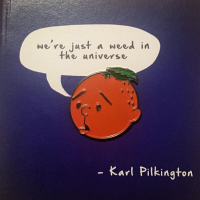MLB 2026 Off season
Comments
-
Oh fuck yeah0
-
Cliffy6745 said:
Baseball is the best sport in the world. That last half inning was perfect
 8/28/98- Camden, NJ
8/28/98- Camden, NJ
10/31/09- Philly
5/21/10- NYC
9/2/12- Philly, PA
7/19/13- Wrigley
10/19/13- Brooklyn, NY
10/21/13- Philly, PA
10/22/13- Philly, PA
10/27/13- Baltimore, MD
4/28/16- Philly, PA
4/29/16- Philly, PA
5/1/16- NYC
5/2/16- NYC
9/2/18- Boston, MA
9/4/18- Boston, MA
9/14/22- Camden, NJ
9/7/24- Philly, PA
9/9/24- Philly, PATres Mts.- 3/23/11- Philly. PA
Eddie Vedder- 6/25/11- Philly, PA
RNDM- 3/9/16- Philly, PA0 -
Ha and I was referring to the inning before the fighteeriepadave said:0 -
ohCliffy6745 said:
Ha and I was referring to the inning before the fighteeriepadave said:
Although the "fight" doesn't seem to spark the Pirates except for that Rodriguez dude. Who apparently has a bad temper.8/28/98- Camden, NJ
10/31/09- Philly
5/21/10- NYC
9/2/12- Philly, PA
7/19/13- Wrigley
10/19/13- Brooklyn, NY
10/21/13- Philly, PA
10/22/13- Philly, PA
10/27/13- Baltimore, MD
4/28/16- Philly, PA
4/29/16- Philly, PA
5/1/16- NYC
5/2/16- NYC
9/2/18- Boston, MA
9/4/18- Boston, MA
9/14/22- Camden, NJ
9/7/24- Philly, PA
9/9/24- Philly, PATres Mts.- 3/23/11- Philly. PA
Eddie Vedder- 6/25/11- Philly, PA
RNDM- 3/9/16- Philly, PA0 -
#WaterCoolersMatterStar Lake 00 / Pittsburgh 03 / State College 03 / Bristow 03 / Cleveland 06 / Camden II 06 / DC 08 / Pittsburgh 13 / Baltimore 13 / Charlottesville 13 / Cincinnati 14 / St. Paul 14 / Hampton 16 / Wrigley I 16 / Wrigley II 16 / Baltimore 20 / Camden 22 / Baltimore 24 / Raleigh I 25 / Raleigh II 25 / Pittsburgh I 250
-
-
the rogers centre sucks.If I had known then what I know now...
Vegas 93, Vegas 98, Vegas 00 (10 year show), Vegas 03, Vegas 06
VIC 07
EV LA1 08
Seattle1 09, Seattle2 09, Salt Lake 09, LA4 09
Columbus 10
EV LA 11
Vancouver 11
Missoula 12
Portland 13, Spokane 13
St. Paul 14, Denver 14Philly I & II, 16Denver 22
Missoula 240 -
Price is definitely the most overrated pitcher in baseball0
-
Dammit. Beltre coming out0
-
bumpCliffy6745 said:Price is definitely the most overrated pitcher in baseball
0 -
no, shields is. Price is good but 0-6 in the postseason would make me not want to sign him to a huge contract.Cliffy6745 said:Price is definitely the most overrated pitcher in baseball
If I had known then what I know now...
Vegas 93, Vegas 98, Vegas 00 (10 year show), Vegas 03, Vegas 06
VIC 07
EV LA1 08
Seattle1 09, Seattle2 09, Salt Lake 09, LA4 09
Columbus 10
EV LA 11
Vancouver 11
Missoula 12
Portland 13, Spokane 13
St. Paul 14, Denver 14Philly I & II, 16Denver 22
Missoula 240 -
there's fucking marlins man again.....nyc, pitt and kc.
had to settle for 3rd row tonight.If I had known then what I know now...
Vegas 93, Vegas 98, Vegas 00 (10 year show), Vegas 03, Vegas 06
VIC 07
EV LA1 08
Seattle1 09, Seattle2 09, Salt Lake 09, LA4 09
Columbus 10
EV LA 11
Vancouver 11
Missoula 12
Portland 13, Spokane 13
St. Paul 14, Denver 14Philly I & II, 16Denver 22
Missoula 240 -
Shields was outed a a fraud this year at least. Price is going to get paid way too much for a one pitch fastball pitcher who is not going to age well.imalive said:
no, shields is. Price is good but 0-6 in the postseason would make me not want to sign him to a huge contract.Cliffy6745 said:Price is definitely the most overrated pitcher in baseball
0 -
Pete rose is a moron0
-
+1Cliffy6745 said:Pete rose is a moron
go check chris young (the pitcher) on baseballreference.com
this fucking guy has pitched everywhere.If I had known then what I know now...
Vegas 93, Vegas 98, Vegas 00 (10 year show), Vegas 03, Vegas 06
VIC 07
EV LA1 08
Seattle1 09, Seattle2 09, Salt Lake 09, LA4 09
Columbus 10
EV LA 11
Vancouver 11
Missoula 12
Portland 13, Spokane 13
St. Paul 14, Denver 14Philly I & II, 16Denver 22
Missoula 240 -
costly caught stealing.If I had known then what I know now...
Vegas 93, Vegas 98, Vegas 00 (10 year show), Vegas 03, Vegas 06
VIC 07
EV LA1 08
Seattle1 09, Seattle2 09, Salt Lake 09, LA4 09
Columbus 10
EV LA 11
Vancouver 11
Missoula 12
Portland 13, Spokane 13
St. Paul 14, Denver 14Philly I & II, 16Denver 22
Missoula 240 -
Guy is a tool. He must stink wearing the same outfit every game. Altough the 1 marlins jersey ever sold may be worth money.imalive said:there's fucking marlins man again.....nyc, pitt and kc.
had to settle for 3rd row tonight.Alpine Valley 6/26/98, Alpine Valley 10/8/00, Champaign 4/23/03, Chicago 6/18/03, Alpine Valley 6/21/03, Grand Rapids 10/3/04
Chicago 5/16/06, Chicago 5/17/06, Grand Rapids 5/19/06
Milwaukee 6/29/06, Milwaukee 6/30/06, Lollapalooza 8/5/07
Eddie Solo Milwaukee 8/19/08, Toronto 8/21/09, Chicago 8/23/09
Chicago 8/24/09, Indianapolis 5/7/10, Ed Chicago 6/29/11, Alpine Valley 9/3/11 and 9/4/11, Wrigley 7/19/13, Moline 10/18/14, Milwaukee 10/20/140 -
Baseballs ratings have been awful for awhile. The nl wc game was the highest rated wc game ever. Mlb is sitting on ratings gold with cubs cards and what do they do, have any potential clincher of that series start mid afternoon. What a moronic move. They wonder why their ratings suck. Time to get rid of playoff baseball during the day during the week. Put 2 games againt each other in primetime. Contrary to Lee Elia, some of us actually have jobs! Putting the highest profile team in the playoffs not in primetime is a moronic mistake.Alpine Valley 6/26/98, Alpine Valley 10/8/00, Champaign 4/23/03, Chicago 6/18/03, Alpine Valley 6/21/03, Grand Rapids 10/3/04
Chicago 5/16/06, Chicago 5/17/06, Grand Rapids 5/19/06
Milwaukee 6/29/06, Milwaukee 6/30/06, Lollapalooza 8/5/07
Eddie Solo Milwaukee 8/19/08, Toronto 8/21/09, Chicago 8/23/09
Chicago 8/24/09, Indianapolis 5/7/10, Ed Chicago 6/29/11, Alpine Valley 9/3/11 and 9/4/11, Wrigley 7/19/13, Moline 10/18/14, Milwaukee 10/20/140
Categories
- All Categories
- 149.1K Pearl Jam's Music and Activism
- 110.3K The Porch
- 284 Vitalogy
- 35.1K Given To Fly (live)
- 3.5K Words and Music...Communication
- 39.4K Flea Market
- 39.4K Lost Dogs
- 58.7K Not Pearl Jam's Music
- 10.6K Musicians and Gearheads
- 29.1K Other Music
- 17.8K Poetry, Prose, Music & Art
- 1.1K The Art Wall
- 56.8K Non-Pearl Jam Discussion
- 22.2K A Moving Train
- 31.7K All Encompassing Trip
- 2.9K Technical Stuff and Help






